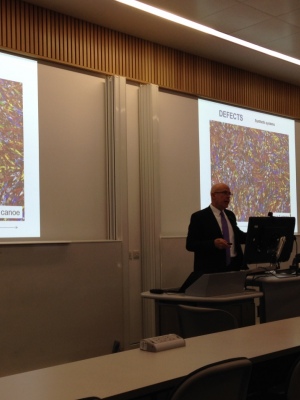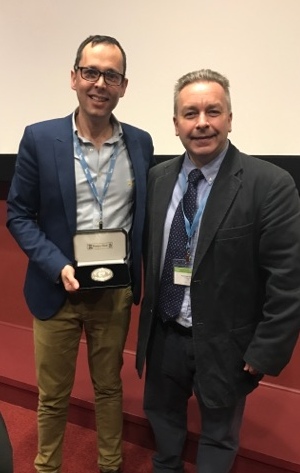Working at molecular interfaces: lessons in collaboration

Liquid crystals
In the week that the UK triggered Article 50 en route to Brexit, two Imperial events were refreshing reminders of the power of collaborative research.
Although the UK looks set to face a more isolated future, Imperial is moving forward with a positive, outward and global mentality. As President Professor Alice Gast has previously expressed, Imperial is a great exemplar of how innovation thrives when cultures collide. Indeed, by managing a range of activities that are designed to foster innovation and collaboration, this is precisely the ethos that the Institute of Molecular Science and Engineering (IMSE) strives to build and nurture.
Something happens when brilliant people move and cultures collide and collaborate
– Professor Alice Gast
President, Imperial College London
Special Guest Professor Juan de Pablo
IMSE was thrilled to host Professor Juan de Pablo from the Institute for Molecular Engineering (University of Chicago) on 30 March 2017. This international visit was kindly supported by the Royal Society’s International Exchange programme, which is intended to stimulate new collaborations between scientists in the UK and overseas.
As IMSE’s special guest, Professor de Pablo spent the day at the South Kensington Campus meeting students and staff, and getting to see the breadth and depth of research being conducted around College. As the apex of the day, he delivered a fascinating and colourful Spotlight Seminar – entitled Nanoparticles in Liquid Crystals, and Liquid Crystals in Nanoparticles – to a rapt 50-strong audience.

Professor de Pablo's IMSE Spotlight Seminar
The importance of interfaces
Rather than just falling into one of the traditionally distinct disciplines that constitute the field of molecular science and engineering, the work Professor de Pablo presented is a great example of molecular-scale science research being applied in an intelligent and informed way to solve engineering-scale problems.
Moreover, de Pablo’s molecular-scale research – which concerns interfacial interactions in liquid crystals (i.e., matter with properties between those of liquids and solid crystals, and which are commonly employed in most modern electronic displays) – also aptly reflects the importance of carefully managing the interfacial interactions of stakeholders from all sectors (from academia, industry, government and beyond) during research endeavours.
You can think of liquid crystals as chemical amplifiers of interfacial events
– Professor Juan de Pablo
Institute for Molecular Engineering
Professor de Pablo demonstrated how the interfaces and surfaces of liquid crystals are the key to controlling their properties. In particular, he showed how confining liquid crystals within microdroplets depends on a delicate balance between bulk and interfacial properties that can be easily perturbed by the adsorption of analytes at the surface.
This discovery provides the basis for innovative developments of inexpensive and ultrasensitive devices for chemical- and biosensing applications, such as for the detection of West Nile Virus and the highly toxic endotoxin molecules found on the surfaces of some bacteria.
McBain Medal: Rewarding interfacial science
In the same week as Professor de Pablo’s visit to Imperial, IMSE affiliate Dr João Cabral (Department of Chemical Engineering) was awarded the 2017 McBain medal from the Royal Society of Chemistry/Society of Chemical Industry (SCI) Joint Colloids Group, at a meeting in London.
Featuring a number of distinguished speakers – including Imperial’s Professor Dame Julia Higgins and IMSE’s previous Highlight Seminar speaker Professor Tom McLeish (Durham University) – the informal day-long meeting focused on recent advances in colloid and interfacial science as a route to materials and processes with societal value.

McBain medal winner 2017: Dr Cabral
The McBain medal is given annually to a rising star in colloid and interface science. Dr Cabral has been recognised for his outstanding work in understanding the thermodynamics and assembly of colloid and polymer mixtures, and in the design of functional materials via interfacial instabilities.
Dr Cabral and his team have pioneered the use of neutrons and X-rays to study flow processing of complex fluids in complex microfluidic flows. His work is also underpinned by strong collaborations with industry, where his research has been translated into many applications – including personal care, photovoltaic and separation process applications.
Molecular Science and Engineering: building bridges
At IMSE, we define molecular science and engineering as melding a deep understanding of molecular science with an engineering mind-set. This concept is emerging as a powerful way to create novel, effective and sustainable solutions to global grand challenges.
The work of Professor de Pablo at the Institute of Molecular Engineering and of Dr Cabral – on two different sides of the Atlantic – highlights the true power of collaborative and holistic approaches in science and engineering.
By breaking down, rather than building, barriers between people and disciplines, we can create a fertile ecosystem for finding innovative and cost-effective solutions to real-world problems.
Learn more
To find out more about IMSE’s role in facilitating brand-new collaborative relationships at Imperial, come along to the Annual IMSE Stakeholder Event on 20 April 2017.
The results of seven IMSE-supported transdisciplinary proof-of-concept studies will be showcased at the event, including a study of chemical compounds that may have been important building blocks for galaxies.
The Institute’s first briefing paper – entitled ‘Molecular science and engineering: a powerful transdisciplinary approach to solving grand challenges’ – will also be officially launched at the event.
Article text (excluding photos or graphics) © Imperial College London.
Photos and graphics subject to third party copyright used with permission or © Imperial College London.
Reporter
Dr Shoshana Z Weider
Faculty of Engineering